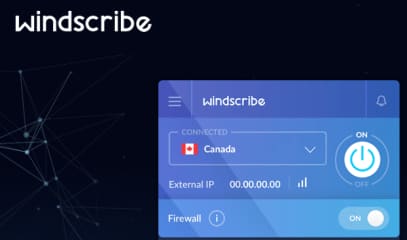This article is about my experience with Windscribe VPN service (referral link to their website). Sort of a review, but basically my own reminder. I’ll start by explaining VPN services in general, then move on to talking about Windscribe.
This article is not sponsored by Windscribe, nor any other company (I wish it were! 🙂 ). For more details, see: why do I publish this stuff?
Status: Active
From January, 2021 – ongoing
I’m actively using (and paying for) this service. There’s no more honest recommendation than that.
Table Of Contents (T.O.C.):
- What is a VPN?
1.1. Security and privacy with a VPN
1.2. Does VPN impact the Internet speed? - Windscribe VPN
2.1. VPN server location choices
2.2. Security and privacy
2.3. Speed – performance
2.4. A static IP address?
2.5. The number of simultaneous connections
2.6. Technical support - Installing and configuring Windscribe client
3.1. Installing Windscribe Linux client with OpenVPN
3.2. Installing Windscribe Linux client properly - Windscribe VPN affiliate program
- Prices
- Tin-foil hat – for laughs
- Conclusion and my personal opinion
- Tools used
1. What is a VPN?
VPN is an acronym for a Virtual Private Network. What is that?
Here I’ll give a short, oversimplified explanation (when I find the time, I’ll write a separate post on VPNs, where I’ll explain the different types).
First let me explain the basics of networks, very briefly:
If you are reading this, your computer, or smartphone, is probably connected to a router. This enables it to connect to the Internet, from what is basically your device’s local network (LAN – Local Area Network).
If your smartphone is connected to a mobile GSM network (like 3G, 4G, or 5G), then you are connected to your mobile service provider’s router, “patching” you through to the Internet.
If the network you are using has several devices, then you either have a switch, or the router also works as a switch – allowing several devices to use one router, one Internet connection.
Now imagine having a local network (LAN) with several computers – either at a company, or at home. And imagine having a remote computer, say in London, that you wish to connect with the other computers as if it were there, within the LAN. That’s what VPN enables, that’s what it basically is.
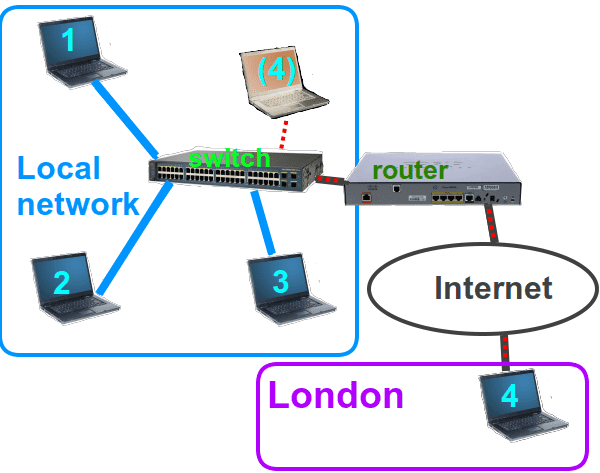
Picture 1
VPN (depicted by a red dotted line) is a sort of a tunnel, a way to “deceive” the other computers into “thinking” that the remote computer is with them, on their LAN. As long as the computer 4 is connected via a VPN to the LAN, everyone thinks that it comes from that LAN – both the other LAN computers, and any other computers, or servers on the Internet.
What if we want one of the LAN computers to appear as if they are coming from London? Well, we could configure the computer 4 to act as a VPN server, and create a tunnel, for any of the LAN computers to use.
It could be said that a VPN uses the Internet to act as a very long network (UTP) cable. 🙂
1.1. Security and privacy with a VPN
What about security?
Sure, we could make the VPN connection be encrypted, so no one can know what gets transferred through the VPN tunnel.
VPN, by itself, won’t protect you from viruses, or stop you from clicking on links in unverified emails. Caution and common sense are still needed – there’s no perfect solution, no auto-pilot.
What it can do, however, is prevent the administrator of the router you are connected through, from seeing any of your login passwords, by analyzing the router’s traffic. Handy in public places. Same goes for anyone sniffing the communication as it is on its way from the computer, to the VPN server.
Note: websites that properly enforce TLS/SSL connection (https protocol) are safe in these terms, even without using a VPN. But VPN does keep you safe even if website admin messes something up, bluntly put.
Privacy?
What happens if you use the computer 4 from picture 1 as a VPN server, and encrypt the connection to it?
- As I connect to the Internet, my internet service provider (ISP) will se that I’m connecting to the computer 4. But they will not know which websites I visit using that VPN tunnel, what I download, upload etc.
- When you go to google.com, Google will think you are coming from London, and that your IP address is the one computer 4 has (computer 4 router’s outbound IP address to be precise).
- However, if you log into Gmail, Google will know it’s you – in spite of using a secure VPN. Same goes for any other service, like Facebook, Linkedin, YouTube etc.
This is very important for anyone privacy, or security concerned. Many people don’t understand it, and many VPN providers don’t note it.
Windscribe F.A.Q. page does state this. Even though it’s not on their front page, I’d say they are pretty straight-forward in explaining what they do offer, and what they don’t.
A bit more about privacy. What if you always used computer 4, with its same IP address, as a VPN? Especially if you are the only person using it – not just one of a thousand. Anyone really interested and worth their salt could figure out it’s you – all it takes is for you to log in to any service (Gmail, Linkedin etc.) only once, on any day. That is why good VPN providers “patch” many different customers through one VPN server, and often “change” IP addresses (oversimplified, without now going into the details of how this is done).
There are many different VPN kinds and implementations. Not all are able (nor intended) to provide security, or privacy. Having said that, most of the VPN service offers you see on the Internet are advertised and intended for providing just that. Some are even good at it! 🙂
If you are interested in more details about who can track whom, and how – Gox and I wrote almost all we know in the article called: GPS, GSM, WiFi, Bluetooth, FM, Internet. Yes, a very creative title, we’re both really “gifted” at that. 🙂
1.2. Does VPN impact the Internet speed?

Using a VPN inevitably slows down the Internet speed – to a certain degree. It also increases lag.
Lag is the time needed for establishing the connection. It is expressed in milliseconds, but for some use cases, like competitive online gaming, every split-second counts.
How much does a VPN slow down the Internet?
It could be un-noticeably little if it is of high quality and well-chosen. Let me explain with an example:
- I am in Novi Sad (Serbia, Central Europe).
- Say I choose a VPN in London (UK).
- How does that affect my Internet connection speed? It depends on which websites I’m visiting, i.e. where their hosting servers are placed.
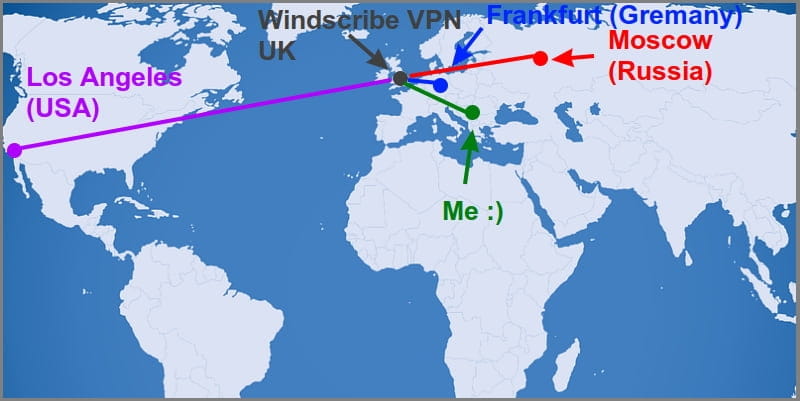
Picture 2
- If I’m connecting to a Los Angeles based website (server), the route through my London VPN is near the shortest possible I could have taken without going through the VPN tunnel.
- But! If I’m connecting to Frankfurt, then my London VPN is the longer way round – making the connection speed slower than it would have been if I connected directly, without using the VPN tunnel.
- Now, imagine if my VPN server were in Los Angeles. It would make my connections to London, Moscow, and Frankfurt based servers travel roughly double the distance, with more “hops” – resulting in a larger speed decrease. Connecting to a nearby server in my home town would make the connection travel a thousand times longer distance (Novi Sad -> LA -> Novi Sad, instead of going directly to the neighbourhood)!
- Basically, when using a VPN, your every connection goes:
your location -> VPN server location -> destination you are connecting to (webiste/server)
Now you know why it’s important to choose a VPN server that is close to your location.
2. Windscribe VPN
After a long introduction – let’s get to the point.
Is it good?
Yes. I’m using it, paying for the service. That’s probably as honest a recommendation as it gets. Out of all the available options, promotions, and discounts, I’ve settled with Windscribe and am still happy with it (in case of any changes, I’ll update this article – to avoid consciously misleading anyone).
Netflix?
Works like a charm.
Avoiding geo-blocking for other websites and services (“this content is not available in your country…”)?
Yup, no problems.
How much did Windscribe pay me to write this?
Hahaha 🙂 I’ll discuss that in the 4th chapter, but if you are interested in hearing my experience with their service, read on.
Why did I choose Windscribe VPN?
It has to be said: I’m far from a VPN expert. Especially in terms of trying various commercial, privacy & security-centered VPN solutions.
To avoid testing 100 different options, saving myself time, I asked the people whose knowledge, experience and recommendation I trust. Most notably, Mr Anthony Smith from Inception Hosting (now acquired by Clouvider hosting). So I don’t know how most other, well-known VPN providers perform, I just know that Windscribe works great – and I think it’s fair noting all this.

2.1. VPN server location choices
In chapter 1.2. I explained why it’s good to choose a VPN server that is near your location. Windscribe offers a huge range of different server locations. USA, UK, Germany, Canada… those go without saying. But Serbia? Woohoo! 🙂
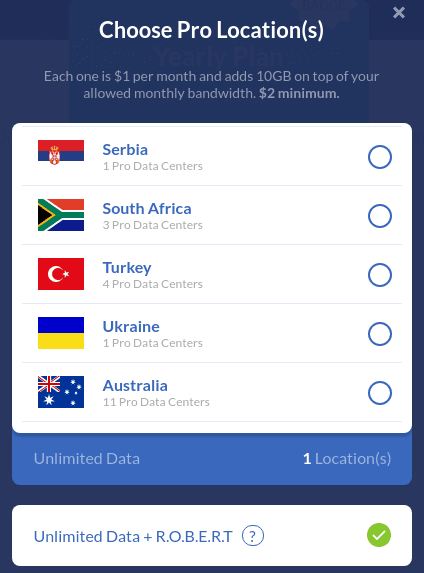
Picture 3
Additional beauty is that Windscribe can automatically choose the server with the best connectivity to your location (and, I presume, the lowest load).
2.2. Security and privacy
In today’s world? Seriously?

Picture 4
However, if you are very privacy & security concerned, and the above-depicted option is out of the question, Windscribe is among the closest alternatives to that (in terms of privacy, not the view). They will do whatever is up to a VPN to protect your privacy, but do read chapter 1.1. to understand the limits of that, i.e. what is still up to you in order to preserve your privacy online.
For all I could test, there have been no IPv6, or DNS leaks (Wiki link). All the traffic is encrypted and goes through the VPN server.
Bottom line:
- My ISP doesn’t see the websites I visit, and all the communist propaganda I read. 🙂
- Likewise, when connecting via a public Wi-Fi, Windscribe’s VPN prevents the router admin from knowing the horrors I read on the Net (a valuable public service I highly appreciate 🙂 ).
- If I don’t log onto any service while using the VPN, no other potentially interested party can figure out what I’m doing. If I do? Well, the answer is: “it depends,” but I won’t go into details since that’s beyond the scope of this article
(Windscribe paid me only 10 goats for writing it – see chapter 4 for the payment details). - US intelligence? See chapter 6.
Windscribe swears they practically don’t keep any logs of your activity (for the details, see their privacy policy). Just make sure to configure your client properly – 3rd chapter explains that.
“As good as it gets” is how I’d describe Windscribe (2 more goats for this, please!).
2.3. Speed – performance
“Yes, but can she dance!?” 🙂
The speed is great. How did I test it?
- I tested in Novi Sad, at two locations:
Location “A” – Public Internet of a mediocre quality.
Location “B” – Home Internet of a decent quality. - VPN server used was in England (UK).
That’s far from the closest one to my location. - Speed was tested by Speedtest servers at three locations:
Toronto (Canada)
Los Angeles (USA)
Frankfurt (Germany)
As expected, with a VPN, the connection to Frankfurt had to go a long way around (through London), so the connection speed was slower compared to directly connecting through my Internet provider. As you can see in the screen-shots below, PING is drastically increased with the VPN, and the download speed is some 10 to 20 % slower:
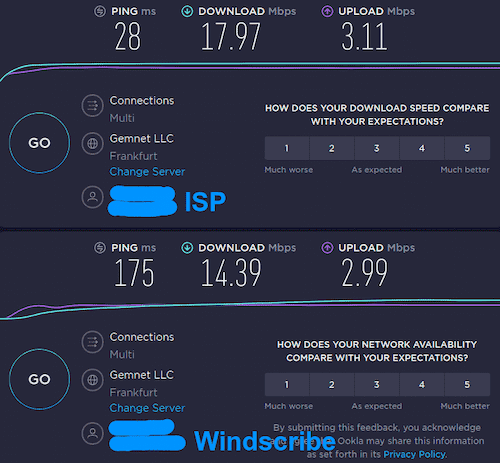
Picture 5
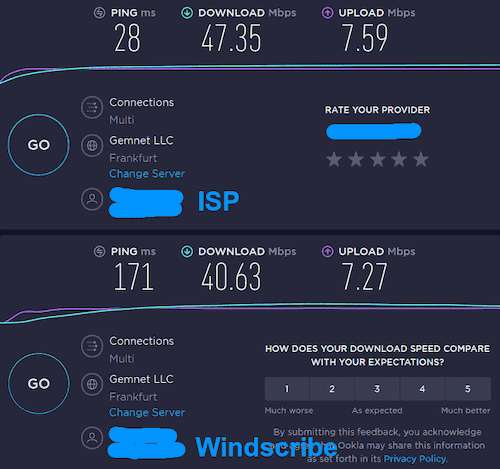
Picture 6
This was a very poor VPN server location choice – yet the results aren’t too bad at all.
For testing the Los Angeles connection speed, England (UK) based VPN location is a bit less catastrophically poor choice. The connection doesn’t go too much around. So I got some very good results – very little speed reduction:
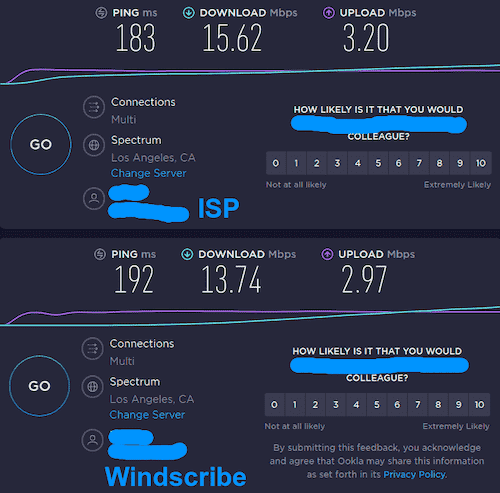
Picture 7
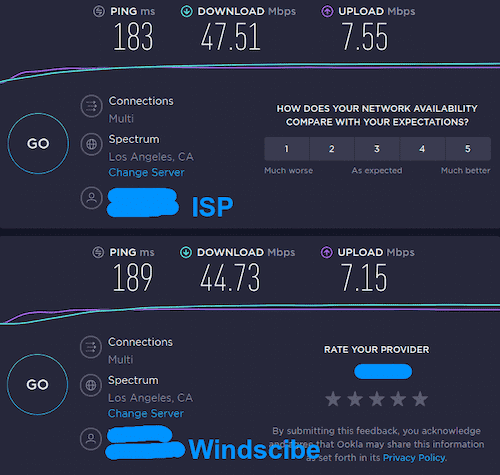
Picture 8
I got similarly great results when testing Toronto (Canada – the super-polite Americans 🙂 ) connection speed:
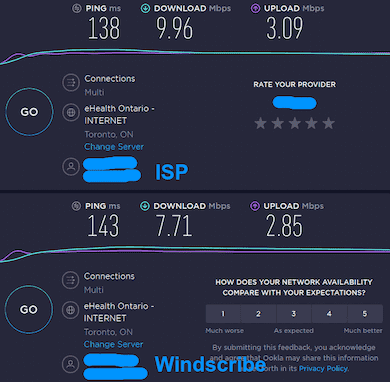
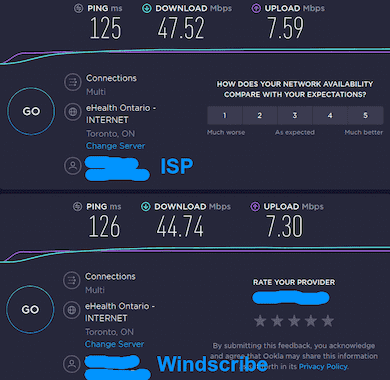
Picture 9
What happens if I choose a more reasonable VPN server location? For Serbia, in my experience, that is Germany (good performance, relatively close, and very good connectivity). Let’s put that to the test. This time I only tested from the location “B,” using Frankfurt, and Los Angeles Speedtest servers:
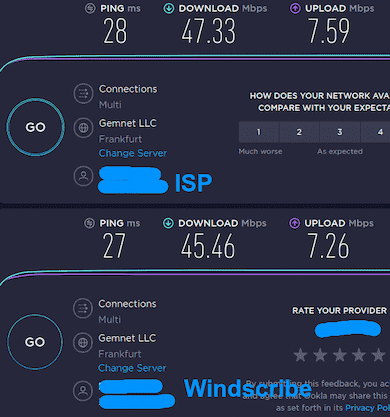
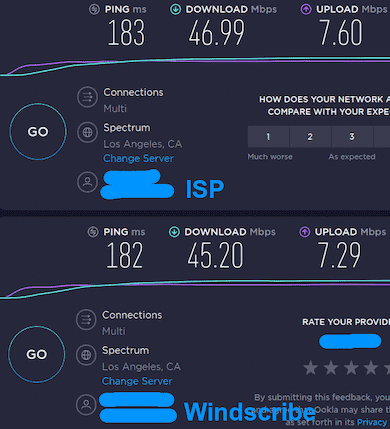
Picture 10
Change in PING speed is within the margin of a statistical error, while download, and upload speed drop is really very minor.
This was better than I had expected – very good speed.

It is my understanding that my 50 MB/s Internet connection isn’t fast enough to put Windscribe VPN server bandwidth to the test. I would expect people with 80 MB/s, or faster Internet connections to be “reduced” to 50 MB/s, but couldn’t check that to confirm.
Update April 2022: I tested Windscribe with a 250/80 Mbps (download/upload) Internet connection. Download got limited at just under 50 Mbps, while the upload could reach the top speed (as without a VPN) of just under 80 Mbps.
Update July 2022: Speeds seem to have improved. Now, depending on which Speedtest server I choose, I get up to 150 Mbps (definitely more than 50 Mbps). Upload goes as high as my ISP allows it (practically the same as without a VPN).
2.4. A static IP address?
With Windscribe that’s available! It’s charged extra, but available as an option.
Not all VPN providers offer a static IP address option. Is that even good for the privacy? No. But it has some uses. For example, you can configure your server to only allow connections from a given IP address. Strong passwords and keys go without saying, but this is an extra layer of protection.
The explanation why no system can be 100% secure, by definition, and how each additional security layer also introduces extra user inconvenience: how to secure a website, and security layers.
Of course, you could pay your Internet provider for a static IP address, but what about working from a remote location, or being on the road? This is when a good VPN with a static IP address comes in handy.
An extra advantage of using a VPN with a static IP address is that you are less likely to be blocked by any filters, or firewalls. At a lot greater price, they offer a residential (“home”) IP address that makes avoiding the mentioned filters even easier (haven’t tested that).
Additional charm is that Windscribe allows port-forwarding. What more could you ask for?
…Perhaps a few more goats… OK, I’ll stop. 🙂
What about privacy?

– those who like dad jokes
– and those who can count
With Windscribe, each static IP address is “shared by up to 10 different customers.” This enables several things:
- Your static IP is relatively secure, only up to 9 other, random customers can use it – so any hacking, or abuse risk is greatly reduced. There’s also a much smaller probability of that address being blocked by some server, because someone tried hacking it from that address.
- You are provided with a high degree of “plausible deniability” in case of any prosecution (for whichever reasons). I.e. it can’t be proven without a reasonable doubt that it was you doing anything in particular from that IP address. At least based on the IP address alone, there are other legal and technical concerns, but you get the point?
This works great in practice – the only problem I’ve had is with Google Analytics. Yes. If they can’t track you, they don’t let you use their tracking software. 🙁
“analytics.google.com” has to be whitelisted in your VPN, for the Google Analytics dashboard to work. Goes both for the desktop client, and the Windscribe browser extension. It seems like Google won’t give us any data if we don’t provide our data.
Update: Google has started playing nicely, (for) now it works without whitelisting.
Almost forgot: IPv6 tunnels are planned, but still aren’t offered.
2.5. The number of simultaneous connections
Some VPN providers strictly limit the number of connections you can use at any one time. Windscribe says: “just don’t abuse it (i.e. don’t give your account to other people to use it) and we’re good.” And they stick to that. I’ve tried every possible combination: using it on my smartphone, while uploading something from my computer, and doing something third on my laptop. Both at home, at my garage, at work, and in public places.
As long as you are being reasonable, Windscribe is reasonable as well.
2.6. Technical support
It’s very good. You are first directed to their chat-bot Garry, who usually provides relevant articles from Windscribe’s very good knowledge base. If that doesn’t work, Garry asks if you wish to contact a fellow human. The support is email-based, with surprisingly swift response times, that really provide the solution.
Following the success of the model T-800, Garry is tipped by the pundits to become the 2nd robot president of California.

3. Installing and configuring Windscribe client
On their download page, you can get the client for Windows, Mac, iOS and Android. They also have browser extensions.
Windows and iOS client installation and configuration is very easy and intuitive – I don’t think it needs explaining. I haven’t tried the others, except for Linux (more on that later).
Windscribe say that maximum privacy protection is achieved by using their browser extensions in addition to installing their client on your computer (or smartphone). They do have excellent installation guides.
3.1. Installing Windscribe Linux client with OpenVPN
UPDATE 2023:
Now there is a fully functional Windscribe Linux app – so no need to do any of this.
What I’m saying here was tested with various Linux Mint installations. It should work with any Ubuntu-based distro, but I haven’t tested it.
According to Windscribe, OpenVPN is less secure than using their own Linux client, though I’ve had no problems (not that I’m aware of them). I’m not advising, nor recommending you do this. This is for my reference. See chapter 3.2. for a proper Windscribe Linux install.
Install OpenVPN:
sudo apt-get install network-manager-vpncsudo apt-get install openvpn network-manager-openvpn network-manager-openvpn-gnomesudo /etc/init.d/networking restartConfigure and download the config. files and passwords – using this page. This worked for me:
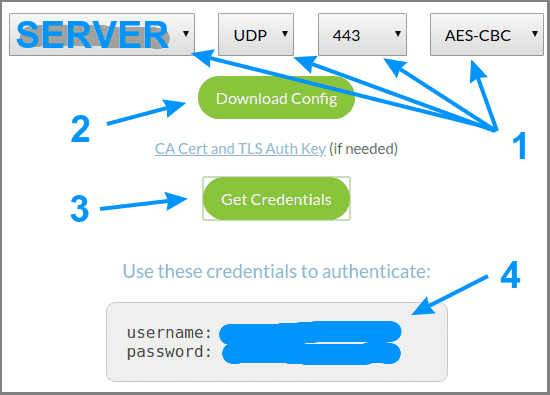
Picture 11
Now we should configure the network connection. Either using the mouse to reach the menu, or running the command (entering the path where the config file was downloaded):
sudo openvpn --config /path/to/downloaded/config.ovpn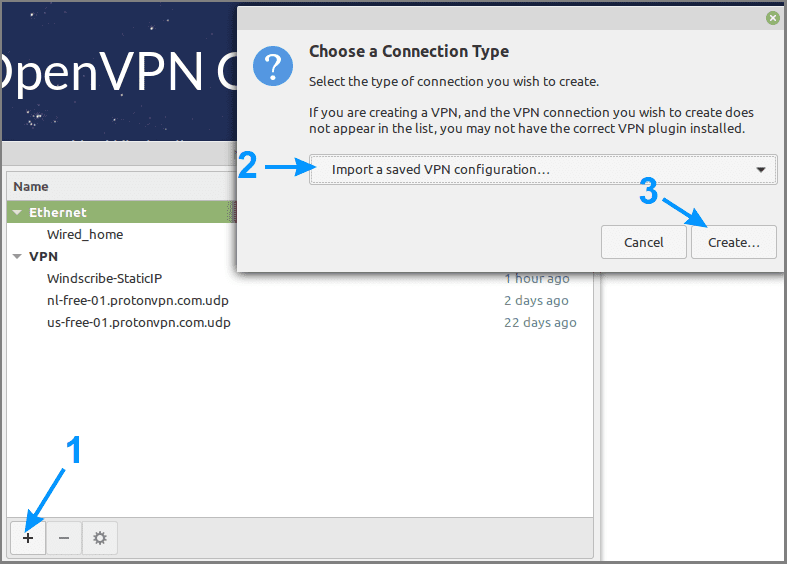
Picture 12
You’ll be asked to choose which config. file to import, and then you’ll get to enter the given username and password:
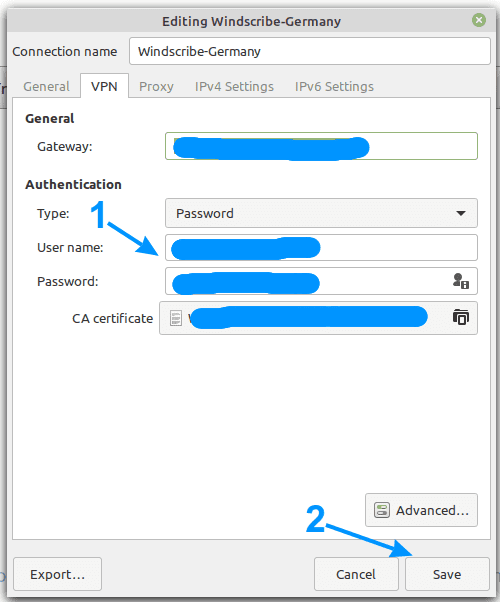
Picture 13
For me, the other options were properly set by default. If you run into any problems, check Windscribe and OpenVPN docs.
Now you can easily connect to Windscribe VPN with a few clicks:
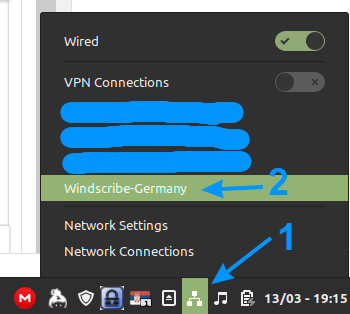
Picture 14
3.2. Installing Windscribe Linux client properly
UPDATE 2023:
Now there is a fully functional Windscribe Linux app – so no need to do any of this.
Instructions for this, sorted by distros, are given on this link. The list of Ubuntu commands, for personal reminder:
Adding the Windscribe signing key to apt:
sudo apt-key adv --keyserver keyserver.ubuntu.com --recv-key FDC247B7Add the repository to your sources.list:
echo 'deb https://repo.windscribe.com/ubuntu bionic main' | sudo tee /etc/apt/sources.list.d/windscribe-repo.listRunning apt-get update (just in case):
sudo apt-get updateInstalling Windscribe CLI:
sudo apt-get install windscribe-cliLoging in using your account’s username and password:
windscribe loginAuto connecting to the closest server:
windscribe connectBreaking the connection:
windscribe disconnectHelp with the switches:
windscribe --help
Listing the available servers:
windscribe locationsConnecting to zi German server:
windscribe connect DE
4. Windscribe VPN affiliate program
What is an affiliate program? An option of adding links to products on your site, such that when someone buys a product using that link, the seller gives you a commission (percentage).
Windscribe’s affiliate program is like the Serbian space program: non-existant! 🙂
Here’s their explanation why they no longer offer it: We’re not paying for #1. The article boils down to this: people are writing product praises just in order to get affiliate commissions. And they don’t want that kind of advertising.
Fair enough. My thoughts on the topic:
I think that affiliate sales are a fair way of making money. You bring the customers, while the seller gives you a percentage of the profits. If you don’t bring customers – you don’t get paid. Do people abuse that? Definitely! I deeply despise all the crap content that the Internet is full of, written “for SEO,” and/or to make affiliate sales (how to make good content).
Do I use affiliate links for the products I recommend (or even for those I criticize)? Definitely! It makes no sense not to – when it’s available. And I’ve been accused of shilling, and of astroturfing (Wiki link) even for some articles without a single affiliate link. If I praise a product that someone doesn’t like – “that’s shilling!” If I criticize a product someone likes – “that’s astroturfing!” 🙂
In this article, I’ve praised Windscribe a lot. You may take my word for it that I wasn’t paid, sponsored, nor asked to do it. Or you may not. Judge for yourself, as with everything else you read on the Internet – it’s not easy.
Judging by Windscribe’s prices, and their service quality, I suppose they have no “room” to pay any affiliate commissions. Is word-of-mouth advertising enough to keep them in business, and for them to continue growing? I don’t know, but this is my contribution (though, again, I wrote this trying to be as objective as possible – and I’ll update it in case of any future problems).
Would it be wise for them to raise the prices by 5% and use that for paying the affiliate commissions? Maybe. Personally, I’d like every product I love and praise to pay affiliates – though that is most often not the case (tough luck 🙂 ).
Having said that, for all I know, the competition pays very large commissions – often over 30 %! Would I like to pay 30 % more for Windscribe? Hell no! And I don’t think they could compete with only 5, or 10 % commissions, because most “SEO gurus” will advertise what pays best.
For example (and for the profits! 🙂 ): here’s my affiliate link for NordVPN. If you click on that (without using a good VPN, so the tracking code could work), and buy the service, I’ll get 100 % of the first payment, then 30 % for as long as you are subscribed (“lifetime”). That’s publicly available data, nothing shady.
I’m not saying, nor implying that NordVPN is bad, or not worth the price they charge, but I also can’t say that it’s good and worth it – I haven’t tried it.
Update: they do have a referral program (for) now. You can use this link and both you and I will get a +1 GB bonus on a free plan. Woohoo! 🙂
5. Prices
The prices are clearly shown on Windscribe’s website (referral link).
I paid 24 $ for one year of a static IP address for a VPN server location I wanted. Sneaky salesmen will say that’s 2 $ per month, but when you pay, you pay 24 $, and you need to have those. That’s reasonable, because Windscribe’s static IPs aren’t crowded, so I suppose some planning and provisioning is required.
I also pay 2 $ per month for unlimited data transfer at full speed, smart malware and tracking protection, with a great ad-blocker (see R.O.B.E.R.T.), and get an extra VPN server location of choice.
That’s about 50 $ per year for this pleasure. It’s not nothing, but it’s not too much, considering how much it makes my life easier.
That’s a “Custom plan,” but they have other plans, offering a lot more different VPN server locations, for a similar price to what I’m paying in total.
Fun fact: Windscribe doesn’t take goats… though I do.
6. Tin-foil hat – for laughs
How secure is our encrypted communication on the Internet?
For those interested in the working principle, see the article: Asymmetric encryption explained.
Breaking the encryptions takes a very fast computer. A good friend of mine, Gox, is really into the quantum computers these days, and we discussed it a bit. They are advancing – and while they aren’t likely to completely replace the “normal” computers for every task, breaking encryptions is one of the tasks they are likely to excel in.
Current encryption keys are 4096 bits large. If a key is of the same length as the content it encrypts, it is theoretically impossible to break it. 4096 bits is not nearly the size of an average IP packet. That’s not all. Once authentication is achieved, the data between our computers and servers is encrypted using AES-256 algorithm, with a 256 bits long key.
Officially, quantum computers still can’t break 256 bit key in any reasonable time. Unofficially – I wouldn’t bet my life (nor my liberty) on that no one in the World can do that today.
I don’t expect anyone to bother with this to harass me for downloading a torrent. But I don’t think anything I do on-line is really private – even with a VPN.
This is not an ordinary review… 🙂
7. Conclusion and my personal opinion
Is Windscribe VPN good? I’m using it and am happy. That was my main motive for writing this drivel review: people and companies offering top-class service at reasonable prices are hard to find, and they deserve all the praise they can get.
Should you pay for this service?
It depends. Do you really need a VPN? I hope this article explains nicely what VPN can, and can’t do – so it’s up to you to weigh how much what it can do is important to you (it rhymes! 🙂 ).
They do offer a free service with up to 10 GB of monthly data cap, and lower speeds – so you can try it for free.
I certainly won’t be angry if you use my NordVPN affiliate link and buy that service, but I’ll give myself the liberty to recommend: give Windscribe a try, they are good, you might like it! 🙂
(my Windscribe referral link)

8. Tools used
- Wireshark – for testing if the traffic is encrypted.
- DNS leak test.
- IPv4 and torrent leak test.

